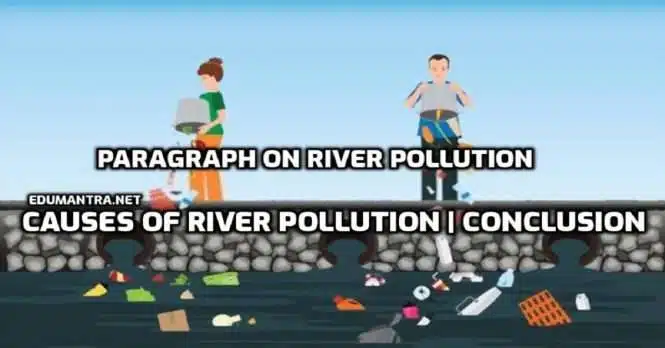
Rivers are usually seen as a source of life and happiness, but unfortunately, some people choose to pollute them, harming the environment and causing harm to the people who use these waterways for recreation.
Here is paragraph on river pollution. In this article, you will find information about why rivers get polluted and why it is important to prevent pollution.
Paragraph on River Pollution
Rivers are one of the most important water resources in the world, and yet they are also some of the most polluted. Why do rivers get polluted and what can be done to prevent it? In this blog section, we will discuss the causes of river pollution, and how you can help prevent it from happening.
The Causes of River Pollution
There are a number of different factors that can contribute to river pollution, including industrial dumping, sewage overflows, farming practices, and climate change. Each of these causes has its own set of consequences that can lead to widespread pollution.
Industrial Dumping: Industrial dumping is the release of waste products or pollutants from factories, mills, or other industrial operations. This type of pollution can come from a variety of sources, such as oil refineries, chemical manufacturers, and construction sites. This pollutes rivers very badly.
Sewage Overflows: A sewage overflow is when wastewater from a building or home flows into a river or other body of water without being properly treated. This type of pollution can cause major environmental damage by causing toxic algae blooms and causing fish kills.
Farming Practices: Farming practices can pollute rivers with a lot of harmful substances. These substances can cause major environmental damage, including the poisoning of water resources. For example, runoff from farms can contain pesticides, fertilizers, and other chemical pollutants.
These pollutants can cause major water pollution problems, including the depletion of water resources and the creation of toxic lakes and reservoirs. In addition, farming practices can also release large amounts of methane gas into the atmosphere. This gas is a potent greenhouse gas that contributes to climate change.
Why Rivers Get Polluted
Pollution in rivers can come from a variety of sources, including wastewater discharge, agricultural runoff, and manufacturing emissions. The main ways to prevent pollution from occurring are through effective waste management and environmental protection measures.
Wastewater discharge is the largest contributor to river pollution. Excessive amounts of wastewater runoff can result from improper treatment of wastewater, a lack of infrastructure to properly dispose of wastewater, or inadequate sanitary facilities. Wastewater discharge can also result from industrial activities, such as manufacturing and mining.
Agricultural runoff is another major source of river pollution. Agricultural practices, such as deforestation and overgrazing, can lead to the release of pollutants into waterways. Additionally, agricultural runoff often contains chemicals and fertilizers that can harm aquatic ecosystems.
Manufacturing emissions are another major contributor to river pollution. Manufacturing processes produce a variety of pollutants, including organic compounds, heavy metals, and dioxins. These pollutants can end up in rivers when they are discharged into water bodies.
Effective waste management and environmental protection measures are the best way to prevent river pollution. These measures include reducing the amount of wastewater that is discharged into waterways, improving the treatment of wastewater, and implementing policies to reduce industrial emissions.
How to Prevent Rivers from Getting Polluted
There are many ways to prevent river pollution. Governments, businesses, and individuals can all play a role in reducing the amount of waste that is discharged into rivers. In addition, people can take steps to reduce their own emissions. This will help to reduce the amount of pollution that reaches rivers in the first place.
What Can Be Done to Prevent Rivers from Getting Polluted?
There are many things that can be done to prevent river pollution. For example, farmers and companies can be encouraged to use more environmentally friendly methods of agriculture and fuel combustion. Governments can put in place regulations to prevent polluting activities from happening. And the public can help raise awareness about the importance of protecting rivers by choosing to drink water from clean rivers or using rainwater harvesting to collect drinking water.
Conclusion
Rivers get polluted for a variety of reasons, but the most common culprits are agricultural runoff and industrial effluents. Agricultural runoff includes things like animal waste, crop residue, and water from irrigation systems.
Industrial effluents can come from factories, wastewater treatment plants, oil refineries, and other types of processing facilities. There are many ways to prevent river pollution from happening in the first place, but often times it is difficult to identify the sources of contamination until it is too late.
Fortunately, there are many organizations working to reduce river pollution and protect our environment. If you’re interested in learning more about how you can help improve river health or preventing river pollution in your area, please read on!